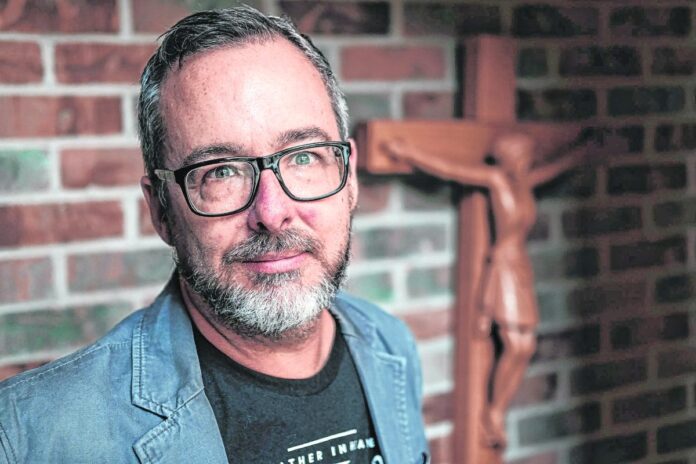I learned a very important lesson early on in our marriage. When I asked wife Stacy how she was doing, and she responded, “I’m fine,” she really wasn’t fine. In fact, every time she replied with that phrase, there was something significantly wrong, but she didn’t want to talk about it yet. I learned my lesson the hard way. The truth was that she did want to talk about it, just not yet. Every time I hear someone say the phrase, “I’m fine”, I know there is probably something wrong.
The phrase “I’m fine” really doesn’t mean that I’m doing fine, does it? Typically it means that I have things going on that I really don’t want to burden you with, so I keep it to myself. Or maybe I’m not ready to talk about it, so I do my best to cover it up, pretending that everything is all good.
In Christian circles, we use the phrase “I’m fine” many times each Sunday morning, as we greet one other at church. Each of us struggling with something, but most of us putting on our smile and saying that we are OK, but we are really not. It is so part of our culture that we don’t even notice that we are doing it. It is just how we do relationships, and it is killing us and killing the church.
I think “fine” is the equivalent of Christian destruction.
When we say it, we are really destroying Christian community.
Let me explain.
We miss out on healing
As we begin to put on these masks to hide our wounds, to hide our struggles, we close ourselves off to the healing that comes through sharing in true community.
James 5:16 For this reason, confess your sins to each other and pray for each other so that you may be healed. The prayer of the righteous person is powerful in what it can achieve.
I saw this in action a while back. During a membership class, one of the attendees shared that they were in a valley, that they had lost the fire that they once had. Now typically, a membership class is about sharing the information about what the church believes and where it is headed.
But this Holy Spirit showed up in an amazing way as person after person loved and encouraged our struggling brother. I sat back and watched this happen in awe in the power of authenticity and love. One sweet woman asked if she could give a hug to the person who was struggling. As they embraced, I teared up.
People opening up to one another, sharing their sins, hurts and struggles. That is how we find healing.
We isolate others
When we act like everything is OK, we unfortunately communicate to others that they are alone in their struggle. Church sometimes can seem like a gathering of completely healed people. But that isn’t the truth, is it? When someone who is struggling and they receive the “I’m fine” or “I’m good” from everyone — it can be isolating. “I don’t fit in here because everyone has it all together.” Masks lead to isolating others.
If these fake smiles define our community, that it isn’t the kind of community that is going to change the world. If all of us are being fake, then we are no different than any other social club or organization.
As someone who struggles with chronic pain, I’m rarely feeling great. So many Sundays, I walk around greeting people before and after service, with a fake smile on my face. It is what I do. Everyone does it. But should we?
Fake smiles
When reading the second chapter in Rob Prince’s book “Chronic Pain: Finding Hope in the Midst of Suffering,”I was struck with the question — “Is the word smile in the Bible?”
“The word smile is only found in one book out of the 66 books in your Bible, and you would never guess which one. In fact, if we were to play a guessing game in which book in the Bible you would find the word smile, it might be your last guess.
It’s in the book of Job. Job! Just in case you haven’t read ol’ Job lately, it’s not a book that’s particularly known for its grins, giggles, and belly laughs. And to be perfectly honest, none of the three references in the book are of Job remembering a happy time, reminiscing about a good day, or “smiling in his storm.”
I’m not advocating being grumpy either. Smiling is a good thing to do, but it should never be forced.
What I believe is a missing ingredient in church is authenticity. By authenticity, I’m saying that we should be ourselves, our true selves. I’m not suggesting we dump our problems on everyone, but rather we communicate as open and honest as we can.
We must also strive to build relationships that hold us accountable to our struggles and allow for a deeper level of openness and trust.
I am challenging all of us to begin to develop authentic relationships with those around us. By taking off the masks, we can begin to see the beautiful mess that lies within of those who are on the journey with us.
We are on a journey together from brokenness to wholeness. And when we can be authentic with one another we will experience God’s love in a different way — through the authentic relationships of those that we are journeying with.
A simple challenge
The challenge is simple. When someone asks you how you are doing, don’t reply with “I’m fine.” Instead, offer an appropriate glimpse into your life. An example might be, “I have had a rough week, but I’m so thankful to be here today.” I’m sure we all can come up with good examples of how to communicate to others how we are doing on our journey.
Let’s take off our fake masks (not our face masks), and stop using our fake smiles. Instead, let us open our lives to the healing that comes through authentic community.
Paul Dazet is the new senior pastor at Sandy Hook United Methodist Church in Columbus. He can be reached at [email protected]. Send comments to [email protected].





